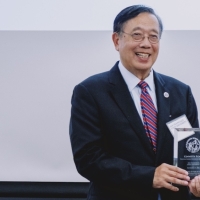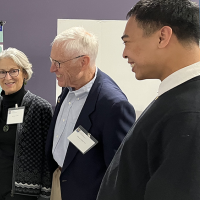Amy Sueyoshi, Ph.D., Current SF State Provost and former Dean of the College of Ethnic Studies, began her career at San Francisco State University as an Associate Professor in Sexuality Studies and Race and Resistance Studies in 2002 and served as dean from 2018 to 2022. An accomplished author, Provost Sueyoshi has also been a community organizer in feminist, LGBT, and Asian American causes for 27 years, and has worked in higher education for 22 years, promoting social justice, equity, and empowerment around issues of race, gender, and sexuality. We sat down with Dean Sueyoshi in 2020 to learn about her perspectives on leading the College of Ethnic Studies in a rapidly changing world that is markedly different from that of the 1968 strikers whose 6-month walkout and protest led to the establishment of the college.
The current interim Dean of the College of Ethnic Studies is Catrióna Rueda Esquibel.
Q: Can you tell us about the College of Ethnic Studies (CoES) and your students?
A: In 1968, our founding strikers envisioned establishing a college built on the principles of culturally relevant and accessible education. We take pride in offering transformative degree programs that resonate with students’ present-day issues. Our classes bring a broader context to the struggles that our students face and simultaneously inspire them to take action. Through our curriculum, we shed light on structural inequalities and ask students to seriously consider ways in which they can participate in social change through movement-building.
“The data shows that both minors and majors in the College of Ethnic Studies have the highest graduation and retention rates in the University. In fact, even taking just one of our classes increases graduation rates for non-majors and minors.”
-Dean Amy Sueyoshi
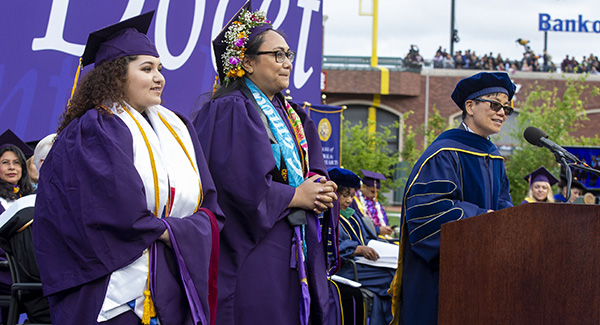
Left to right at San Francisco State University's 2018 Commencement: Arianna Vargas, Student Speaker, Levalasi Loi-On, COES Hood, Dean Amy Sueyoshi
“We take pride in offering transformative degree programs that resonate with students’ present-day issues. [...] Today more than ever, we need a citizenry who can think critically, communicate their views, and have compassion for themselves and the communities that surround them.”
Q: What are the strengths of the College of Ethnic Studies?
A: The faculty is super dedicated to the students. They see themselves reflected in the student body and relate to them. Many of the faculty have similar family backgrounds to our students, so they understand the struggles they're experiencing as they progress through college and can rally them to do better in the classroom. They remain very much committed to student well-being, academic success, and community engagement as central in higher education. During the very beginning of the COVID-19 crisis, many of our faculty voluntarily switched their fall 2020 classes to remote learning modalities to safeguard the health of our students and their families. Since studies show that students of color do not do as well online versus face-to-face, our faculty have taken every opportunity to attend workshops that the college, University, and CSUs provide.
Q: How could funding from donors make the college’s strengths stronger?
A: General fund dollars pay for instruction in the classrooms, the “main entrée" of what the University offers to the public. There are other things that we are doing, typically without funding – things like faculty workshops to improve their teaching, creating pipelines from community colleges or prisons, showcasing community engagement opportunities, kickstarting field study and faculty research projects, and implementing special initiatives on advancing student retention and graduation for our current students. These are all things that could be more robust with additional resources. Donations also allow departments to host public lectures and forums to create a larger education platform that amplifies national and international perspectives.
In addition, our curriculum serves students across the University – not just our majors and minors – through offerings that fulfill general education (GE) requirements. Around 80% of the college’s courses are designated as GE. That means students can fulfill the critical thinking, government, history, English, or science requirements in the College of Ethnic Studies where classes center on race as critical in these conversations. Notably, students tend to prefer taking GE courses in our college – for example, instead of more conventional law or civics courses, they might take an American Indian law class.
We've been involved in external national surveys and internal surveys at the University, and the findings show that among all the majors, the College of Ethnic Studies scores the highest in six out of seven high-impact practices that are recognized as ways to engage students effectively. The data also shows that both minors and majors in the College of Ethnic Studies have the highest graduation and retention rates in the University. In fact, even taking just one of our classes increases graduation rates for non-majors and minors.
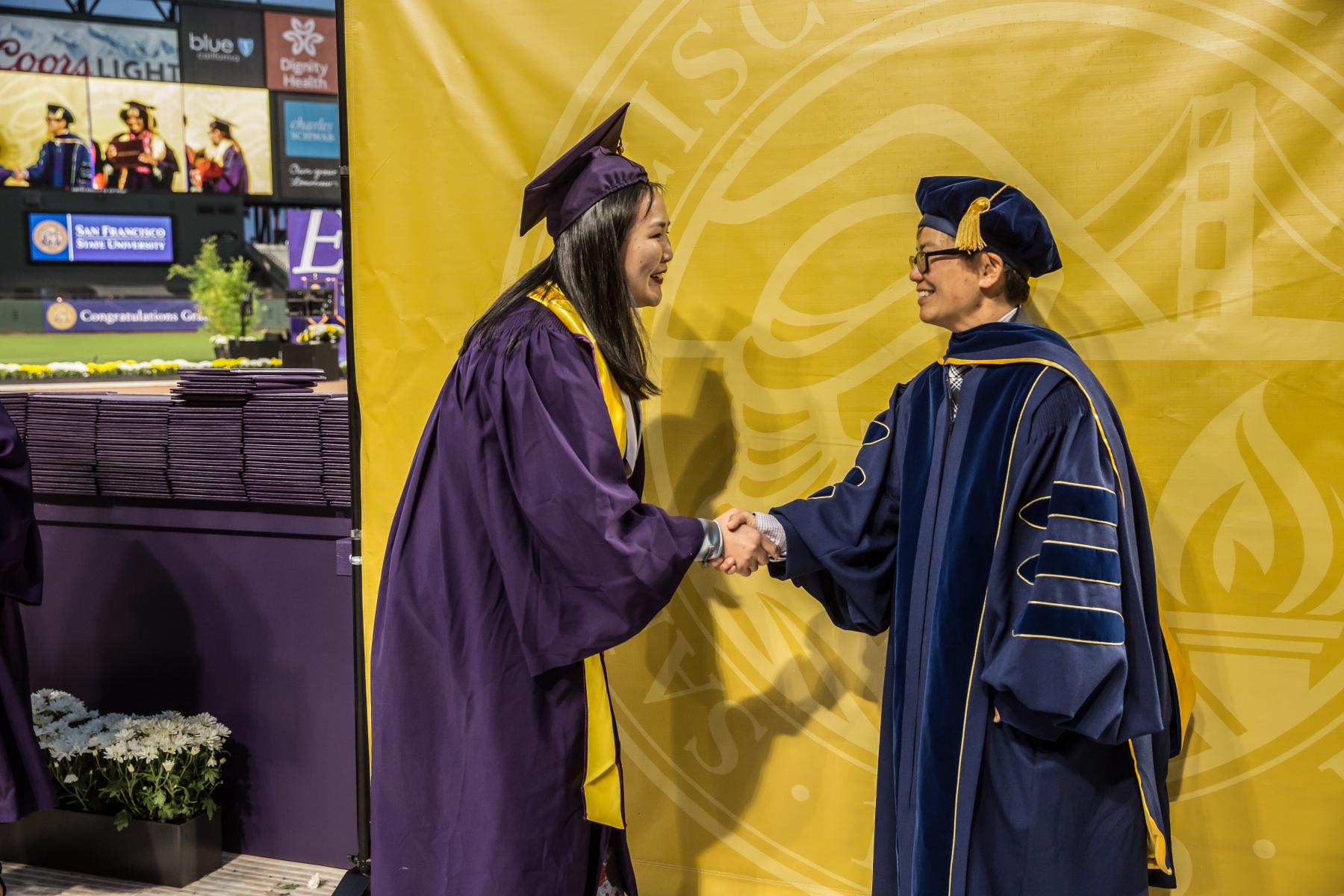
Dean Amy Sueyoshi greets a graduating student at Commencement
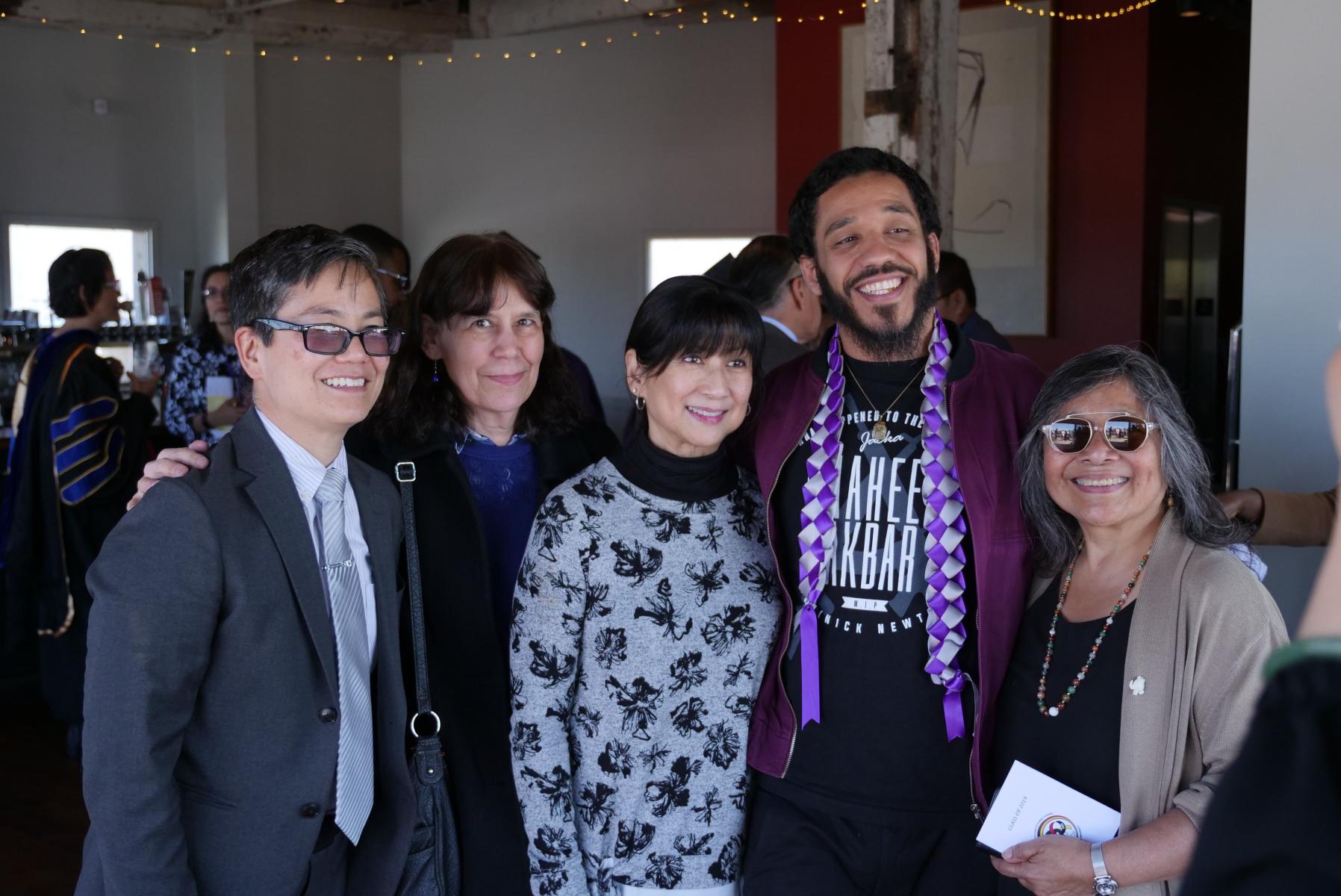
Dean Sueyoshi at a College of Ethnic Studies celebration of the 2019 Commencement
Q: Society has changed since the College of Ethnic Studies was formed in 1969. How has the college changed, and how will it need to shift in the future to stay relevant?
A: When the college was first formed, it was not necessarily feminist, nor queer-friendly. Currently, the faculty and the tenure track faculty in our college are upwards of 68% women of color faculty, and the majority of our students are female. If you look at the national professoriate, it's only about 2% to 6% women of color faculty. Thus, the college provides an incredible work and learning environment in which female academics of color can thrive and bring their frame to the classroom as well as to college administration.
We also have sexuality studies courses in almost every department in the college now, whereas when I first came to the College of Ethnic Studies we had them in only one department. In fall 2019 we grew our minor programs to twelve total, with the approval of new minors in Queer Ethnic Studies, Critical Mixed Race Studies, and Critical Pacific Islands and Oceania Studies. Several years ago, we added a minor in Arab and Muslim Ethnicities and Diasporas Studies. So, I do think that the college is doing a better job at being more inclusive and keeping current.
Q: How have demographic and societal changes in the Bay Area affected the trajectory of the college?
A: There's been an increased demand among our students, to both become teachers and also health professionals. So, we're responding with several new educational pathways for these careers within the college.
For example, the Asian American Studies Department is collaborating with the Elementary Education Department on a social science teacher credential waiver program that would enable Asian American Studies majors to become elementary school teachers after graduation. We also just submitted an application to the California Teacher Commission to participate in a waiver program that allows students to take a set number of classes that fulfill one of the social science teacher credential requirements; it will be equivalent to taking the subject matter test.
As we know from studies in education, people from communities of color are at a greater disadvantage when it comes to standardized tests, and they’re expensive to take. We’ve already had a pipeline program in the college called Pin@y Educational Partnerships (PEP), where faculty members take undergrads into high school classrooms and have them assist with teaching Ethnic Studies classes. Among PEP’s accomplishments was initiating the inclusion of ethnic studies curriculum in the San Francisco Unified School District, which a number of districts across the state of California are now adopting.
We are also seeking approval for a college-wide online degree completion program in Ethnic Studies which we wouldn’t have been able to do in the 1970s. We can now offer classes online to folks who were unable to finish college after finishing their lower-division general education and have them graduate with a B.A. in Ethnic Studies.
Q: What do you think is the value of studying Ethnic Studies in an academic setting?
A: The ethnic studies degree has both a practical application in terms of the employment market, as well as social significance. California is facing a potential shortage of college graduates in terms of workforce needs. Many tech companies say that what they're lacking is people who can think critically and problem-solve, which is the core of the ethnic studies curriculum.
Many of our graduates go on to careers in the nonprofit world, education, and social service organizations. Our curriculum broadens their perspective to better serve their clients or students in a more meaningful manner. Moreover, we can see ethnic studies today as particularly relevant with the awakening of mainstream America to the reality of racialized state violence through the mass movement for Black lives. As this nation cries for more socially conscious workers, people educated in ethnic studies will play a crucial role in creating a more just and equitable society. Today more than ever, we need a citizenry who can think critically, communicate their views, and have compassion for themselves and the communities that surround them.
Q: What is your vision for future changes at the college?
A: I would like to see our college expand further into General Education. We do have a number of quantitative reasoning courses that are in queue to be approved. Currently, our courses are heavily embedded in the GE, so that most students can get a minor in the College of Ethnic Studies by taking all of their general education courses with us. But how revolutionary would it be if all students, regardless of their major, were to complete their general education entirely within the College of Ethnic Studies? We would still need to develop additional courses in physical and laboratory sciences among other areas, but this would be my dream of how expansive the College of Ethnic Studies could be in defining the larger University and educating masses of Californians on the importance of advancing Black, indigenous, and other people of color.
We are also constantly working on increasing the number of minors and majors in our college since we know students with ethnic studies degrees retain and graduate at higher rates than others. We hope to better reach folx who would like to seek a college degree but lack access to higher education. This includes Californians who may have completed some college but never returned, as well as people who are incarcerated. We are in the midst of creating a pipeline for these future students.
“We can see ethnic studies today as particularly relevant with the awakening of mainstream America to the reality of racialized state violence through the mass movement for Black lives. As this nation cries for more socially conscious workers, people educated in ethnic studies will play a crucial role in creating a more just and equitable society.”
-Dean Amy Sueyoshi
Q: Can you tell me about ways that you are helping students overcome their challenges?
A: We are trying to help students financially in many ways, so they don’t have to work as many hours. We have seen that if a student works for more than 20 hours a week, it negatively impacts their education. We are also doing things like redesigning our courses so they're low or no cost, which means assigning class materials that have no cost. Faculty make every effort to facilitate their students’ success. We saw this particularly in March 2020 when the entire curriculum moved to distance learning, and instructors made accommodations to support students stressed about their health and finances due to the global pandemic.
The generosity of donors who fund scholarships remains critical for our students who are economically marginalized, particularly during this time of high unemployment. Scholarships pay for tuition, books, rent, and food, and allow students to focus on learning rather than worrying about their basic needs. They have additional benefits to students’ well-being, boosting their confidence and making them feel as though others are invested in their education.
It seems also that in the very act of applying for our scholarships we are able to inspire students. We have a number of named scholarships where applicants are asked to write about the person that it is named after, which are typically activists. We've noticed that as students write these applications, they're like, “Wow, I didn't know that this person who was here at SF State 50 years ago was doing all this incredible work.” This kind of relationship building, albeit abstract, also enables students to feel as though they are part of a larger ethnic studies community and history.
Q: Final thoughts?
A: Education really is the key to transforming America. There's no doubt that academia in the past has been thought of as an elitist space for a small number of people to amass power and wealth. However, that is not where higher education stands today. Most people today see it as the great equalizer of opportunity. The College of Ethnic Studies provides an educational space to empower people to become socially engaged change agents to transform not just themselves, but the world in which they live. And we need ethnic studies particularly now more than ever, as our communities respond to state-sanctioned assaults against Black folks, indigenous people, immigrants, queers, and women.



